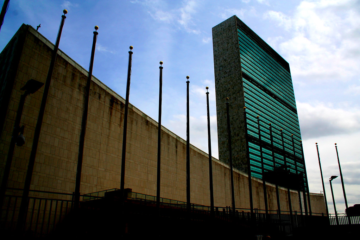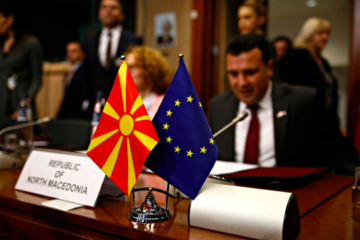In your book you explain that the initial motivation that pushed you to write it is constantly being asked the same questions by policy makers and politicians and argue that you constantly make the same recommendations but these are ignored. Subsequently, the cycle that characterizes West-Russia relations repeats itself. What do you believe is the reason for this consistent incomprehension of Russia?
There isn’t one single isolated reason. These things are always more complicated than a single root cause, but among the most important reasons I would single out a Western liberal democracies being hostage to short attention spans, partly because they are subject to electoral cycles. It happens on not only a political level but also a civil service level: people are rotated, they move around, and you get new individuals that come in to roles who are either not familiar with Russia – probably because they haven’t done it before – or, which is even more dangerous, think that they can fix the “Russia problem” by taking a new approach.
That new approach is always “I can deal with the Russians better than anybody else can”. The lack of institutional memory that goes with the hollowing out of the skill sets and knowledge that were covering Russia during the Cold War is also a huge problem. You just don’t have that depth of expertise so that when people say “let’s have a reset with Russia”, there aren’t enough people pointing out that we have actually tried that many times before and it just doesn’t work.

We do see this assumption that Russia is actually a country made up of one person, or alternatively that Russia is being driven by president Putin into confrontation, instead of the other way around. In fact, Putin is not making any of this stuff up for himself, he is enacting long standing Russian approaches to security challenges and long standing Russian ideas for what those challenges are in the first place. So when he says things that sound bizarre to Western ears, this is not just his own mind, this is just an expression of Russian understandings of what the world outside them that has been constant not just for decades, but for centuries.
So if Putin does go, what changes? My answer is: not much. The system as well as the viewpoints are long standing and well established in Russia. Putin has just been re-establishing a more normal form of Russian government with which the country as a whole is more comfortable than with the one immediately after the end of the Cold War, which was the anomaly in Russian history. So let’s not be too optimistic and think that when Putin leaves things in Russia are going to change for the better, because so often in Russia, things, if they do change at all, they certainly don’t change in the right direction.
We think back to the forced abdication of the Tsar in 1917, which sent shockwaves around the world, but also caused a lot of rejoicing because people thought of tsarism as a repressive regime, a despotic tyranny and they thought that anything that comes after this has to be better. They were very, very wrong, so let’s not make the same mistake again.
We should be quite careful what we wish for.
Extremely careful of what we wish for, especially not in assuming that just because an individual states that he is in opposition to President Putin it makes him a nice person.

One of the ideas that I really liked from your book is the one of cycles in Russia-West relations. You talked about how there is a “reset” after which relations seem to go well, there is a peak and then it all goes down. The annexation of Crimea seems to be quite evidently the low point of the current cycle of West-Russia relations. The situation does seem to be pretty bleak at the moment so it is hard to see how it could get better, but following your argument it should improve eventually. Do you see this happening and if so, how do you see this happening in a relatively near future?
There are two things. First of all, in general with Russia it is a mistake to assume that we have reached the low point because things can always get worse. Just because people are unhappy with Russia over Crimea does not mean that they are not prepared to do things that make everyone even more unhappy. In fact, if we look at the process of incidents that we have seen since Crimea, although it may not affect Europe as a whole so much: the attempted murder of the Skripals, Russia’s appalling actions in Syria… All of these things indicate a disregard for how Russia is seen by the world in general and its European partners in particular.
In terms of where we go from here, we are hearing some very strong mood music suggesting that the overriding idea within the British Civil Service establishment at the moment is looking for an improvement in relations and some kind of “mini reset” in order to put things back on a stable footing. The problem that I warn against again and again is not doing it the same way as the previous umpteenth time that we have attempted to do this because it always repeats the same mistake. Yes, we get a temporary semblance of an improvement in relations, but what happens in reality is that the fundamental differences between the two sides are being ignored in order to have this façade of good relations. And that, of course, as we have seen time and again, just saves up trouble for the future.
In a chapter on prospects for change in Russia you mention Vladimir Pastukhov’s Three generations’ dividing lines and you highlight the ‘generation of the future’ (those born after 2000). Do you think that these unprecedentedly fearless young men and women will bring structural, social and systemic change to Russia or will the country continue down the road is has consistently gone down in its modern history?
I don’t think that change is necessarily going to happen, but I do think that Russia has the best chance at it now than it has had in a very long time because of the distinctive features of this generation which are absolutely unique in Russian history. Again, there has never been a period where mass murder and repression by the state has been absent for so long that you have whole generations growing up without having an idea of really what that is all about and having to be explained to them. It hasn’t been a constant factor of Russian life in their or their parents’ or grandparents’ memories. Looking at the whole span of Russian history, that is quite bizarre.
Plus, of course, the other unique factor is that they can talk to each other in a way that had never been possible in Russia before. This is a country that has been so obsessively concerned over the danger of people sharing unsanctioned ideas and opinions that it has throughout history banned the ways of doing so. Whether it is printed, which has been banned, photocopies, faxes have been banned. The Internet, which arose when the security services of Russia were going through a period of unusual weakness and is now being supressed itself. So put all that together and you have a generation which is unlike any other in Russia history.
But since Russians are known for being great hackers, don’t you think they have a way for controlling their own youth?
There are a couple of factors that constrain this. First of all, the security services have been on the back foot because all of these services have been put in place by the internet service providers, the big corporations, without being controlled by the security services. Incidentally, whose main target has been preventing hostile information coming in from abroad, rather than individuals within Russia sharing information with each other. So my answer is yes, they are taking steps to try to crack down on that sharing of information, but they are also handicapped by their lack of technical expertise and the fact that many of these internet services are indeed designed to work around censorship of that kind. If they try to take down, for example, Telegram, they cause a lot of collateral damage and it doesn’t really work because of these two constraining factors.
They are faced with the same problem that any parent is faced with: these new technologies and new means of communication and sharing of information pop up constantly and you have to keep on top of them and keep up to date with them. In order to be even one step behind your kids.
So far I have asked you questions regarding how the West perceives Russia. You highlight that the misunderstanding goes both ways, Russia also misinterprets the West. Could you give us a couple of reasons, since there is obviously more than one. Why is there this misperception by Russia of Western actions?
Everything that Russia gets wrong about the West tends to make sense and be internally logically consistent, if you proceed from a few very basic flawed assumptions. The key one that drives so much of Russian security thinking is that Russia presents an attractive target and that therefore other countries are going to behave as Russia would and try to take it or take advantage of it. It is not helpful of course that from time to time during the past Russia has been entirely right and other countries have invaded it. The problem is that they apply that principle to today when nothing could be further from the truth and the very last thing that anybody wants is an even less stable and even more unpredictable Russia. It is perfectly reasonable logic, completely mistaken facts on which you are basing your deductions that leads them to read the West wrong. The process by which they reach those conclusions is getting more and more flawed, it is getting worse and worse, because there is this internalisation of Russian politics and the isolation from the West becomes worse, there are fewer and fewer objective parameters by which Russia can measure whether it is actually reaching sensible conclusions about what the rest is doing. If you convince yourself that everybody wants to attack you and therefore you are not interested in talking and engaging with them, there is nothing by which you can contradict this assumption.
Isolation feeds into this paranoia.
Isolation indeed feeds paranoia and feeds this mistaken assessments of world events. We had the classic case of that during the Soviet Union, where the USSR misread the West so badly and so often, because – even when they had people conducting espionage operations and reporting back from Western capitals – those reports were interpreted through this distorted mirror, a prison of Soviet and in fact Marxist views on how the world works and they arrived at complete nonsense.



